If you’re going to need to shop at supermarkets in the UK, then this guide will help you find the best place to buy groceries and other goods.
From a no-frills supermarket or small city center stores to premium food stores or large, out-of-town grocery stores that sell a whole lot more, this guide will take you through all the UK supermarket chains you need to know about.
Written by a lifelong local resident, no less!
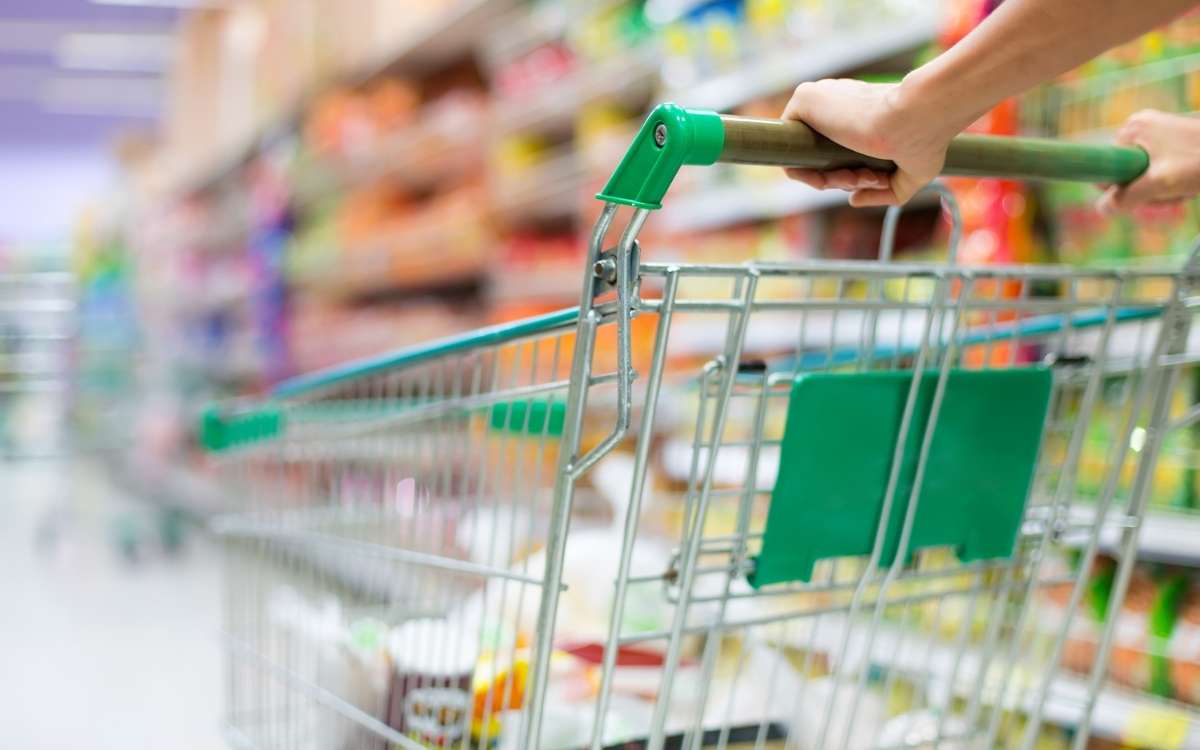
The UK grocery market is an interesting one. It’s largely dominated by several supermarket chains that are often referred to by the UK media as the ‘big four’.
There are, however, a number of important competitors to be aware of, from a German discount supermarket chain or two to convenience stores located in central and residential areas.
The aforementioned ‘big four’ are Tesco, Sainsbury’s, Asda, and Morrison’s, yet Aldi and Lidl each have more stores across the land than the latter two.
Other popular options include Iceland freezer stores located all over the country and M&S premium food-only stores.
One of the UK’s largest department store chain companies also has a finger in the pie with its several hundred Waitrose stores, while Co-op outlets tend to be smaller, self-service shops found in villages or suburban areas.
The Top 10 Supermarkets in the UK
Contents
Read on to discover all you should know about the UK’s biggest and best supermarket chains, so you can decide where to shop.
You might also be surprised by what some of these stores sell in addition to food!
1. Tesco
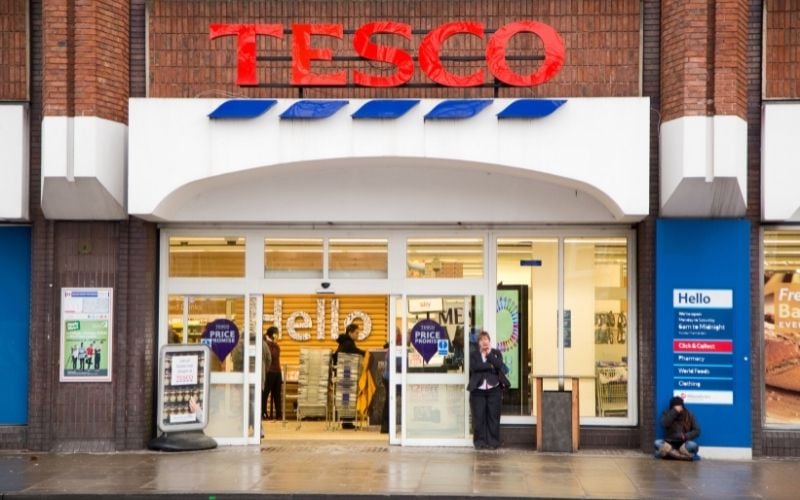
Tesco is the giant of the big four, with more stores than any other UK player. In 2022, Statista said it operated 2,653 stores across the UK, with new ones opening all the time.
Tesco is a major player on a global scale, as well as nationally. According to Wikipedia, it’s the third-biggest retailer in the world when measured in terms of gross revenue.
The size of each Tesco store can vary widely. Tesco Express outlets are small and often located in city and town centers, and are used as convenience stores for those living and working in the area.
The Tesco Express branding came about after smaller stores rebranded from Tesco Metro in 2021.
Tesco Extra supermarkets are large and are superstores rather than just grocery stores.
Here you can typically buy clothing, homeware, and electricals, have your eyes tested, or even sign up for a new cellphone contract.
The tagline used by Tesco since 1993 is ‘Every Little Helps’, and the company says it aims to help their colleagues, the planet, and communities as well as individual customers.
Tesco’s origins are in East London, where it was set up in 1919 by market trader Jack Cohen, the son of Jewish immigrants from Poland.
The company headquarters are now located to the north of the capital in Welwyn Garden City, Hertfordshire, and the first store opened in North London in 1931.
The Tesco name is said to have come from the combination of the T. E. Stockwell tea company (TES) and its founder’s Jack Cohen’s name (CO).
One of the keys to Tesco’s success is the Clubcard scheme, which rewards customer loyalty with points that can be redeemed for various rewards.
Tesco operates in 11 countries outside the UK and runs gas stations as well as retail stores.
With products including the Tesco Value and Tesco Finest ranges, this largest of the UK supermarket chains appeals to customers from all walks of life.
2. Sainsbury’s
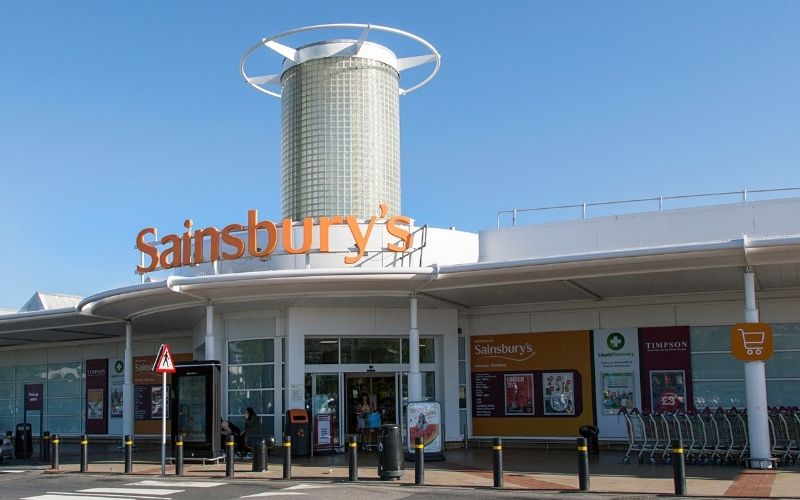
Sainsbury’s is Tesco’s biggest competitor, though it still has some way to go in the UK grocery market before it might catch up with its rival. According to Statista, it had 1,412 UK stores in 2022.
If you’re looking for a local supermarket in the UK it’s fairly likely that there will be a Sainsbury’s store nearby.
The retailer operates smaller stores in city centers and suburban areas known as Sainsbury’s Local, in addition to its larger supermarkets.
Sainsbury’s also began life in London, though it started in the West End rather than the East.
John James Sainsbury opened the first store in 1869 in Drury Lane, Covent Garden, and the company dominated the UK supermarket scene for the majority of the 1900s.
Now their head office can be found in Holborn, London.
As with Tesco, Sainsbury’s also sells fuel through its own gas stations, and its larger stores stock items such as clothing, homeware, and books in addition to groceries.
There is also a Sainsbury’s magazine which is sold rather than given away to customers.
This covers subjects like travel, home, family, and food news as well as including a range of recipes in each issue.
Sainsbury’s introduced a new slogan in 2021, replacing ‘Live Well for Less’ with ‘Helping Everyone Eat Better’.
According to the company, this is to reflect a shift in focus that aims to make good food accessible to all.
The Nectar card scheme now belongs to Sainsbury’s. Customers are awarded points for loyalty, while their data is used to inform brand and product development.
3. Asda
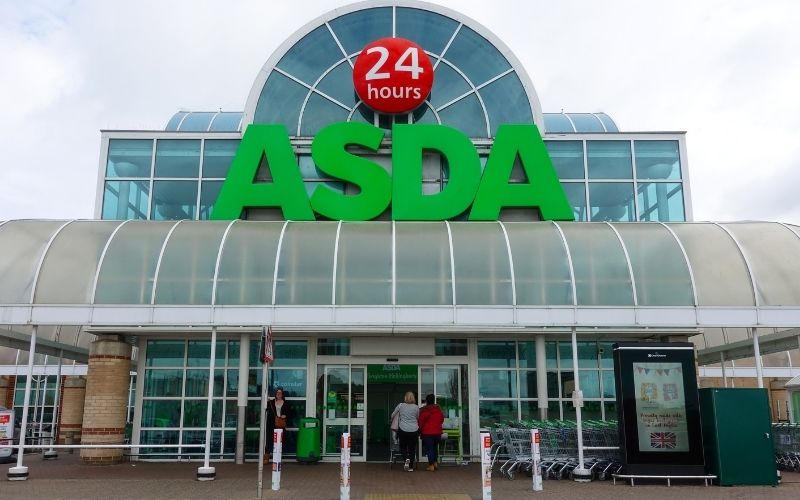
Though Asda trails behind Tesco and Sainsbury’s in terms of store numbers, it’s seen as one of the ‘big four’ and is also a major market player.
In 2022, there were 750 branches throughout the United Kingdom.
Asda is a newer company than Sainsbury’s and Tesco and was established in 1949 in the north of England.
It was formed when Yorkshire-based Associated Dairies merged with a retail company run by Peter and Fred Asquith and Noel Stockdale. Its current headquarters are still in West Yorkshire’s biggest city, Leeds.
Like its rivals, Asda operates a cellphone network and offers financial products such as insurance as well as homeware, clothing, pharmacy services and other general goods.
The store’s clothing label is known as George and is named for the founder of fashion retailer Next, even though his association with Asda ended in 2000.
Asda’s ownership has undergone some changes in recent years.
It was acquired by US-based Walmart in 1999 but was sold in 2021 to a couple of British businessmen and a British equity firm.
Walmart retains a seat on the board and also holds equity in Asda.
At one point there were plans for a merger with Sainsbury’s to create Britain’s biggest supermarket chain, but these were abandoned.
The supermarket has over 30 Supercentres across the British Isles, and these are some of the UK’s biggest hypermarkets. In late 2021, a new tagline ‘Get the Asda Price Feeling’ was unveiled.
4. Morrison’s
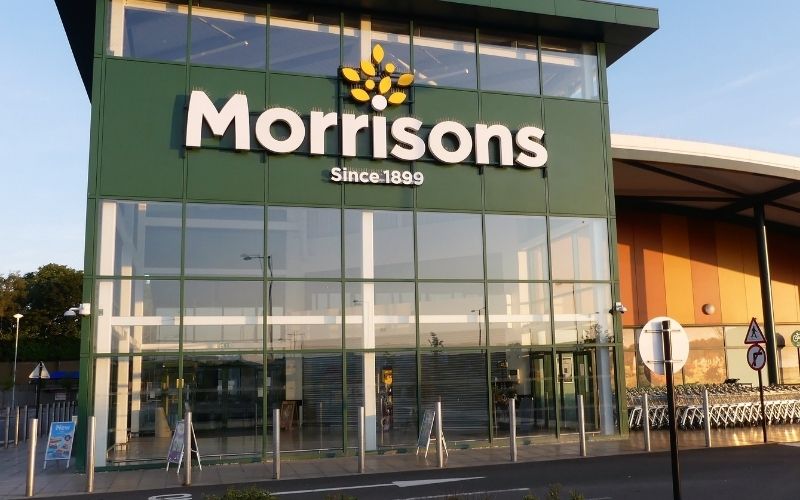
With 491 stores across the country, Morrison’s is the smallest of the ‘big four’ supermarkets.
Like Asda, it is currently headquartered in West Yorkshire, though its base is in Bradford rather than Leeds.
Like Sainsbury’s, Morrison’s takes its name from its founder William Morrison, who started out with a market stall in Bradford. Sometimes it is known as Wm Morrison.
By 1958, the first Morrison’s self-service store has opened in Bradford, and it was the first to have prices displayed on its products.
US private equity company Clayton, Dubilier, and Rice acquired Morrison’s in 2021, and the supermarket scooped the ‘Grocer of the Year’ award in the same year.
The company’s UK market share has wavered between around 10% and 11% in recent times.
Like other British supermarket chains, Morrison’s has its own clothing range, called Nutmeg, although it does not otherwise offer as large a range of non-grocery items as other large supermarket brands.
5. Aldi
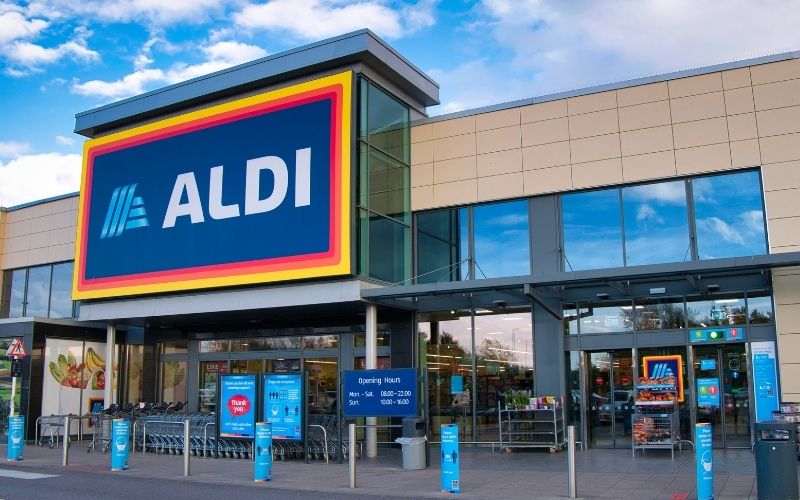
In terms of store numbers, Aldi ranks third in the UK with 750.
The chain is one of two German supermarket chains now prevalent in the country, with new stores opening on a regular basis to challenge the UK supermarket sector.
Aldi was named the Cheapest Supermarket of 2021 by Which, a leading UK consumer guide.
Originally seen as a no-frills supermarket, Aldi’s Specially Selected range has helped the food store in attracting a more upmarket clientele, and is seen as somewhere luxury goods can be acquired at lower prices.
What sets the German supermarkets apart from those first established in Britain goes beyond mere pricing.
Aldi also offers shoppers an ever-changing range of Special Buys, each of which is only available in-store for a limited time.
The company also pays staff more than other chains in the United Kingdom and is known for the high speed at which these people scan goods at the checkout.
In fact, Aldi is designed for customers to pack their bags away from the till, at the packing area provided, in order to speed up this process and keep costs down.
Aldi operates smaller stores than some current UK supermarket chains, although these tend to be bigger than a typical Sainsbury’s Local or Tesco Express.
As a limited range of items is offered, Aldi’s bulk-purchasing power results in lower prices for customers.
6. Lidl
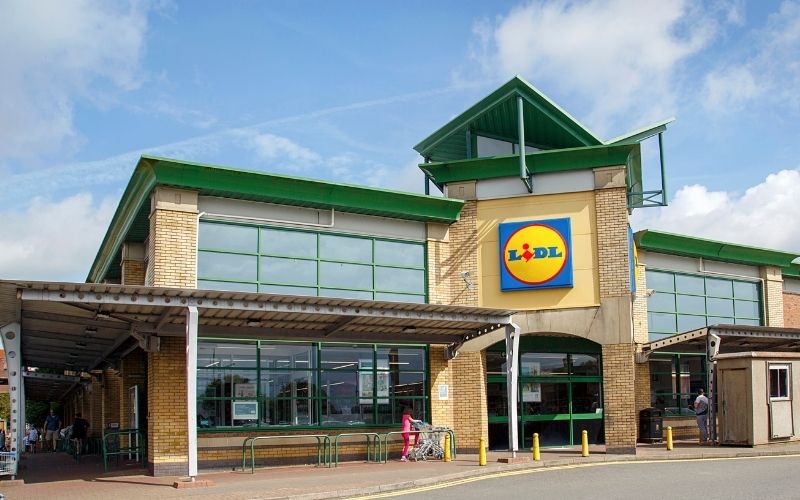
With 700 stores, Lidl is only a little behind Aldi in terms of store numbers and these are found everywhere from city center stores to retail parks and local high streets.
The company is also German and specializes in offering top-quality goods at the lowest possible prices.
Aldi and Lidl are similar in many ways and within the UK public opinion is divided regarding which is best. Both operate themed special buys so customers can bag a bargain during each event for their car, kitchen, or baby.
Lidl also encourages customers to pack away from the checkout and also pays its speedy staff more than some other supermarket chains.
It also operates similarly sized stores to Aldi, though it often stocks more branded goods than its competitor.
Like Aldi, Lidl is also firmly established in countries beyond the UK, and it has stores throughout Europe and even in the US. Lidl belongs to the Schwarz Group, which is the world’s fifth-largest retailer.
7. Waitrose
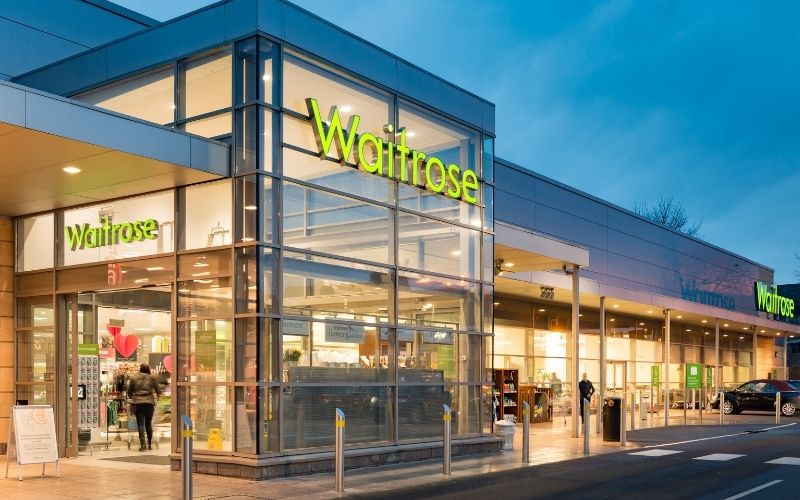
Waitrose is often seen as one of the most upmarket supermarket chains in the United Kingdom.
There are currently 353 stores, and Waitrose was recently rebranded as ‘Waitrose & Partners’ to reflect the importance of its staff, which are referred to as partners rather than employees.
Several Waitrose stores are ‘Little Waitrose’ branches, while a few are also found at ‘Welcome Break’ motorway service stations.
The supermarket’s name comes from two of its three founders Wallace Waite and Arthur Rose, who together with David Taylor founded the brand in 1904.
As of 1937, it belongs to the John Lewis Partnership, which also operates large homeware and department stores throughout Britain.
The roots of Waitrose are in west London, namely the Acton area, where the trio of entrepreneurs first sold groceries. David Taylor left in 1906, and the Waitrose name was used from 1908.
Waitrose has received various awards for the quality of its wine and food, plus its standards of service and animal welfare. It also holds a Royal Warrant to supply the households of the Queen and her son Prince Charles.
8. M&S Simply Food
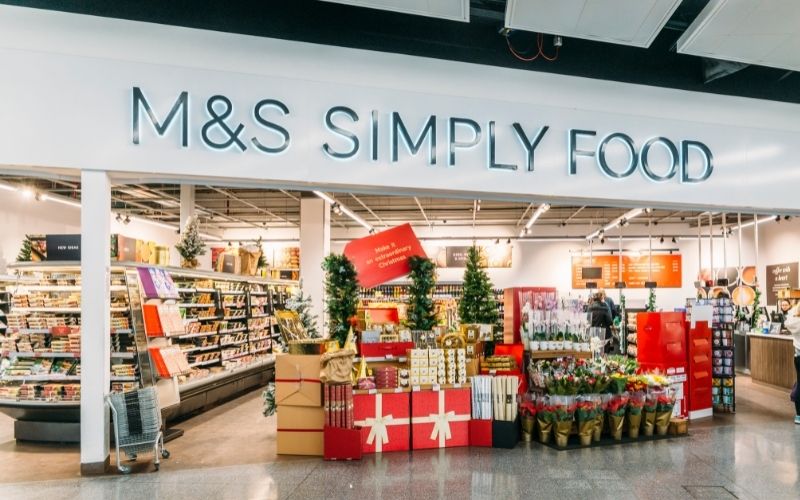
M&S Simply Food stores are found on high streets all over the UK, and represent a shift within the company that incorporates an increasing focus on food.
Marks and Spencer is one of the best-known brands in Britain, and many residents say they will not buy underwear from any other retailer.
The company is known for its high-quality fashion and homeware in particular as well as food and wine.
M&S may be given its full name – Marks and Spencer – or known as M and S, Marks’ or Marks and Sparks. Like Asda, M&S was founded in Leeds, by Michael Marks and Thomas Spencer in 1884.
Like Waitrose, M&S is seen as one of the more upmarket options among Britain’s supermarkets, and branches are often very busy at weekends as shoppers seek special, non-workday treats to eat and drink.
There are also branches of M&S Simply Food at BP gas stations, Moto motorway service stations, and even at airports and train stations.
M&S became famous in the past for its £10 meal deal, which included a main dish plus a side, and a starter or dessert. A bottle of wine was once included, but this no longer applies.
Now the meal deal costs £12: due to the quality of M&S food this is still popular and seen as good value for money.
9. Co-op
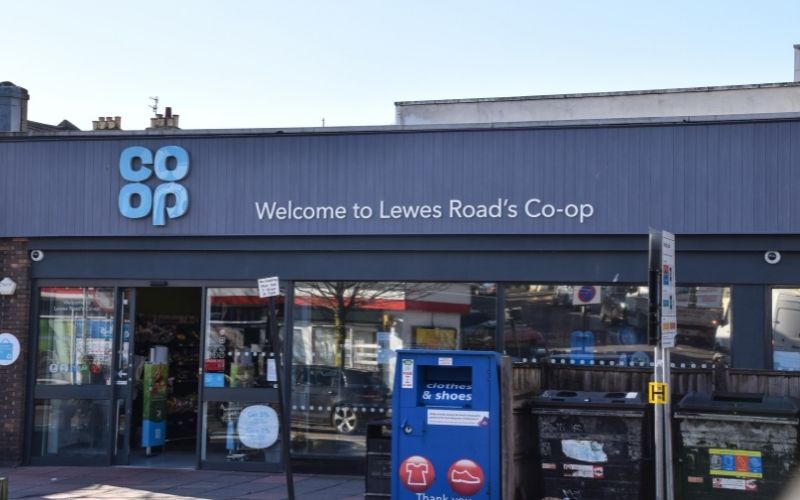
The Co-op name is short for The Co-operative Group’s food stores and there are many branches found throughout the British Isles.
This group also operates funeral services, offers insurance products, and even legal services.
A typical Co-op self-service supermarket store may be found on a suburban high street or at the heart of a small village, though some larger co-operative stores do exist.
At the time of writing, the Co-op has its own unique deals to draw in customers, offering five ‘fill your freezer’ items for £5 or three fresh fruit and vegetable items for £3.
As with other supermarkets, customers can also order food online for home delivery, and since 2021 this can even be done via Amazon.
The Co-op’s own brand ranges include the ‘Irresistible’ premium selection and the budget ‘Honest Value’ range. There are also ‘Free From’ and ‘Gro’ labels for customers with allergies or who are vegetarian.
10. Iceland
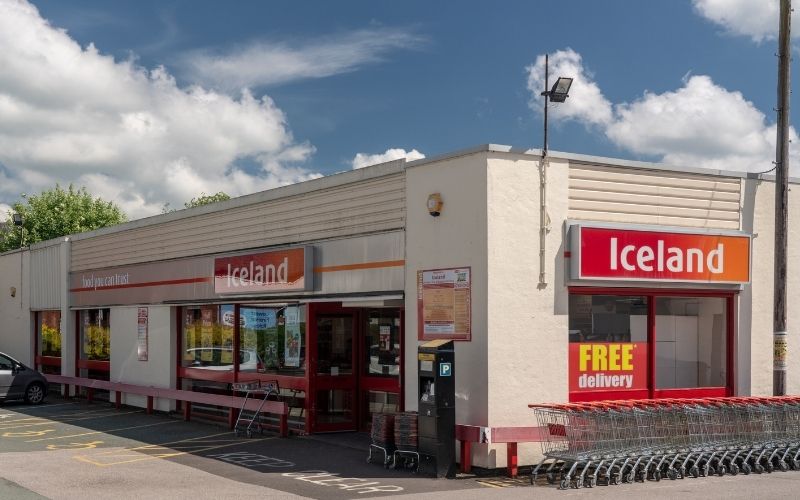
As the name suggests, Iceland specializes in frozen food, although other goods are available alongside these to ensure shoppers can also fill their fridge and pantry at the same time.
Frozen food is more cost-effective due to there being less waste, making the prices at Iceland attractive to many shoppers.
The store also partners with a number of big-name restaurants and fast food brands to offer ranges based on their menus.
Like other UK supermarkets, Iceland also offers home delivery, though its share of the UK market is just a little over 2%.
Established in 1970, Iceland is still a relative newcomer to the market. Unlike other stores, shoppers can select and pay for goods in-store before having them delivered to the door.
Iceland was formed by two Woolworth’s employees – formerly a big name among now defunct UK supermarket chains.
Unlike in Australia, Woolworth’s in the UK was more of a general store than a food retailer, though it sold a lot of candy.
Supermarkets in the UK – FAQs
Who are the big 4 UK supermarkets?
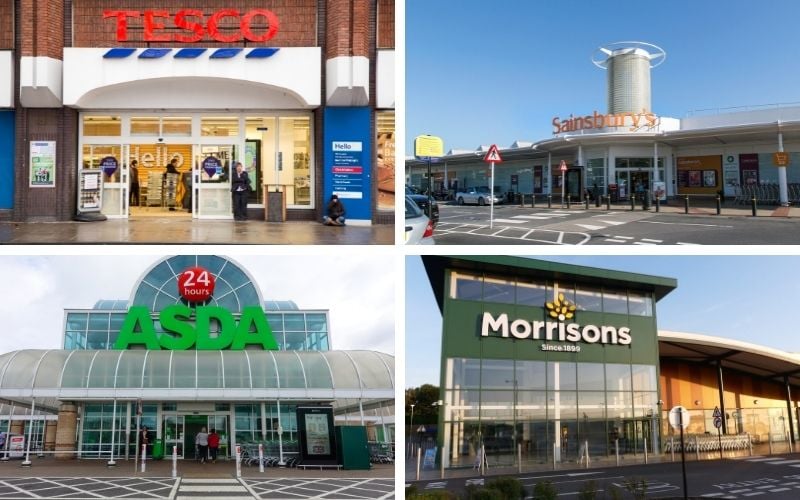
The big 4 UK supermarkets are Tesco, Sainsbury’s, Asda, and Morrison’s, although, for many shoppers, the focus is now shifting towards German discount brands Aldi and Lidl.
Of these Tesco is the biggest with over 2,500 stores. Sainsbury’s has over 1,400, while Asda and Morrison’s now lag behind Aldi and Lidl in terms of store numbers.
Which is the most popular supermarket in the UK?
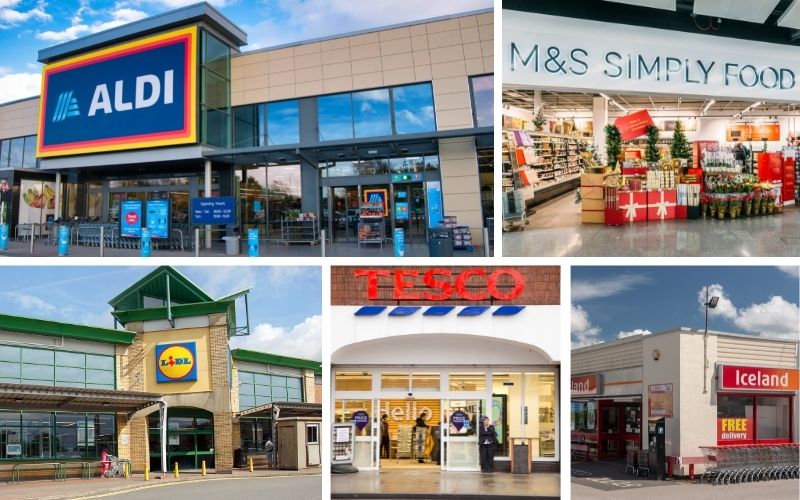
According to a 2022 YouGov poll, Aldi is the most popular UK supermarket among adults of all ages and genders.
Hot on their heels are both M&S Simply Food and Lidl, with Tesco Express and Iceland making up the rest of the top five.
The other stores named in the top 10 are Morrison’s, Tesco, Asda, Sainsbury’s, and the Co-op.
Which supermarkets in the UK will you shop at?
Like many British shoppers, you may well find yourself using more than one supermarket to buy your groceries from, and all retailers have their plus and minus points.
Many people, for example, like to stock up on basics and freezer fillers at one store before heading to another to buy more specialised ingredients or their favorite own-brand products.
Wherever you go and whatever you buy, the range of items available at UK supermarkets places them among some of the best in the world.
